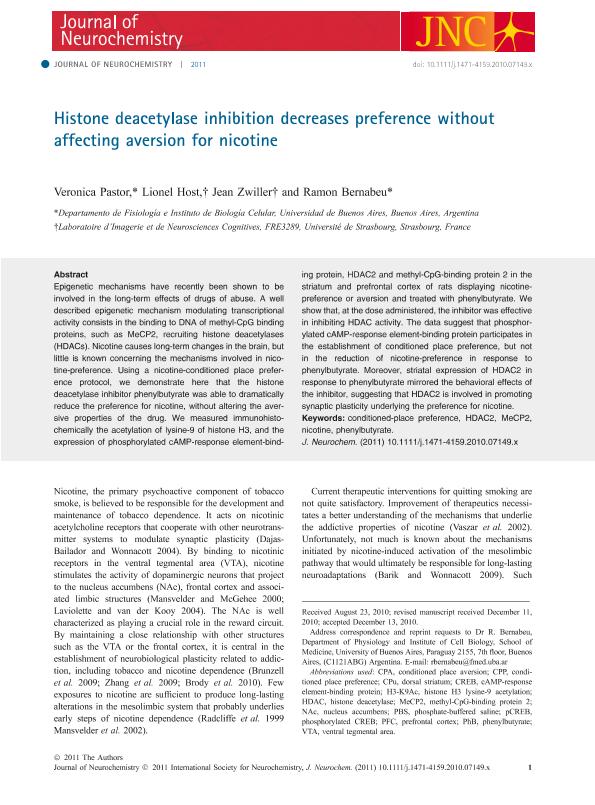Artículo
Histone deacetylase inhibition decreases preference without affecting aversion for nicotine
Fecha de publicación:
02/2011
Editorial:
Wiley Blackwell Publishing, Inc
Revista:
Journal of Neurochemistry
ISSN:
0022-3042
Idioma:
Inglés
Tipo de recurso:
Artículo publicado
Clasificación temática:
Resumen
Epigenetic mechanisms have recently been shown to be involved in the long-term effects of drugs of abuse. A well described epigenetic mechanism modulating transcriptional activity consists in the binding to DNA of methyl-CpG binding proteins, such as MeCP2, recruiting histone deacetylases (HDACs). Nicotine causes long-term changes in the brain, but little is known concerning the mechanisms involved in nicotine-preference. Using a nicotine-conditioned place preference protocol, we demonstrate here that the histone deacetylase inhibitor phenylbutyrate was able to dramatically reduce the preference for nicotine, without altering the aversive properties of the drug. We measured immunohistochemically the acetylation of lysine-9 of histone H3, and the expression of phosphorylated cAMP-response element-binding protein, HDAC2 and methyl-CpG-binding protein 2 in the striatum and prefrontal cortex of rats displaying nicotine-preference or aversion and treated with phenylbutyrate. We show that, at the dose administered, the inhibitor was effective in inhibiting HDAC activity. The data suggest that phosphorylated cAMP-response element-binding protein participates in the establishment of conditioned place preference, but not in the reduction of nicotine-preference in response to phenylbutyrate. Moreover, striatal expression of HDAC2 in response to phenylbutyrate mirrored the behavioral effects of the inhibitor, suggesting that HDAC2 is involved in promoting synaptic plasticity underlying the preference for nicotine.
Palabras clave:
Conditioned-Place Preference
,
Hdac2
,
Mecp2
,
Nicotine
,
Phenylbutyrate
Archivos asociados
Licencia
Identificadores
Colecciones
Articulos(IBCN)
Articulos de INST.DE BIOLO.CEL.Y NEURCS."PROF.E.DE ROBERTIS"
Articulos de INST.DE BIOLO.CEL.Y NEURCS."PROF.E.DE ROBERTIS"
Citación
Pastor, Verónica; Host, Lionel; Zwiller, Jean; Bernabeu, Ramon Oscar; Histone deacetylase inhibition decreases preference without affecting aversion for nicotine; Wiley Blackwell Publishing, Inc; Journal of Neurochemistry; 116; 4; 2-2011; 636-645
Compartir
Altmétricas




